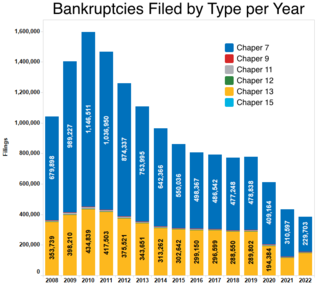Bankruptcy is a legal process through which people or other entities who cannot repay debts to creditors may seek relief from some or all of their debts. In most jurisdictions, bankruptcy is imposed by a court order, often initiated by the debtor.

Maxims of equity are legal maxims that serve as a set of general principles or rules which are said to govern the way in which equity operates. They tend to illustrate the qualities of equity, in contrast to the common law, as a more flexible, responsive approach to the needs of the individual, inclined to take into account the parties' conduct and worthiness. They were developed by the English Court of Chancery and other courts that administer equity jurisdiction, including the law of trusts. Although the most fundamental and time honored of the maxims, listed on this page, are often referred to on their own as the 'maxims of equity' or 'the equitable maxims',The first equitable maxim is 'equity delights in equality' or equity is equality Like other kinds of legal maxims or principles, they were originally, and sometimes still are, expressed in Latin.
Collateral estoppel (CE), known in modern terminology as issue preclusion, is a common law estoppel doctrine that prevents a person from relitigating an issue. One summary is that, "once a court has decided an issue of fact or law necessary to its judgment, that decision ... preclude[s] relitigation of the issue in a suit on a different cause of action involving a party to the first case". The rationale behind issue preclusion is the prevention of legal harassment and the prevention of overuse or abuse of judicial resources.

Estoppel is a judicial device in common law legal systems whereby a court may prevent or "estop" a person from making assertions or from going back on his or her word; the person being sanctioned is "estopped". Estoppel may prevent someone from bringing a particular claim. Legal doctrines of estoppel are based in both common law and equity. It is also a concept in international law.

Res judicata (RJ) or res iudicata, also known as claim preclusion, is the Latin term for matter decided and refers to either of two concepts in both civil law and common law legal systems: a case in which there has been a final judgment and that is no longer subject to appeal; and the legal doctrine meant to bar relitigation of a claim between the same parties.

Central London Property Trust Ltd v High Trees House Ltd [1947] KB 130 is a famous English contract law decision in the High Court. It reaffirmed and extended the doctrine of promissory estoppel in contract law in England and Wales. However, the most significant part of the judgment is obiter dicta as it relates to hypothetical facts; that is, the landlord did not seek repayment of the full wartime rent.
In law, acquiescence occurs when a person knowingly stands by, without raising any objection to, the infringement of their rights, while someone else unknowingly and without malice aforethought acts in a manner inconsistent with their rights. As a result of acquiescence, the person whose rights are infringed may lose the ability to make a legal claim against the infringer, or may be unable to obtain an injunction against continued infringement. The doctrine infers a form of "permission" that results from silence or passiveness over an extended period of time.

In the United States, bankruptcy is largely governed by federal law, commonly referred to as the "Bankruptcy Code" ("Code"). The United States Constitution authorizes Congress to enact "uniform Laws on the subject of Bankruptcies throughout the United States". Congress has exercised this authority several times since 1801, including through adoption of the Bankruptcy Reform Act of 1978, as amended, codified in Title 11 of the United States Code and the Bankruptcy Abuse Prevention and Consumer Protection Act of 2005 (BAPCPA).

Estoppel in English law is a doctrine that may be used in certain situations to prevent a person from relying upon certain rights, or upon a set of facts which is different from an earlier set of facts.

The Bankruptcy and Insolvency Act is one of the statutes that regulates the law on bankruptcy and insolvency in Canada. It governs bankruptcies, consumer and commercial proposals, and receiverships in Canada.
Res inter alios acta, aliis nec nocet nec prodest is a law doctrine which holds that a contract cannot adversely affect the rights of one who is not a party to the contract.

The Piscataqua River border dispute was a dispute between the US states of Maine and New Hampshire over ownership of Seavey’s Island in the Piscataqua River, which forms the border between Maine and New Hampshire. The dispute was settled in 2002 by the US Supreme Court in favor of Maine.

In United States law, the federal government as well as state and tribal governments generally enjoy sovereign immunity, also known as governmental immunity, from lawsuits. Local governments in most jurisdictions enjoy immunity from some forms of suit, particularly in tort. The Foreign Sovereign Immunities Act provides foreign governments, including state-owned companies, with a related form of immunity—state immunity—that shields them from lawsuits except in relation to certain actions relating to commercial activity in the United States. The principle of sovereign immunity in US law was inherited from the English common law legal maxim rex non potest peccare, meaning "the king can do no wrong." In some situations, sovereign immunity may be waived by law.
Ashwander v. Tennessee Valley Authority, 297 U.S. 288 (1936), was a United States Supreme Court case that provided the first elaboration of the doctrine of "Constitutional avoidance".
A Referee in Bankruptcy or Bankruptcy Referee was a federal official with quasi-judicial powers, appointed by a United States district court to administer bankruptcy proceedings, prior to 1979. The office was first created by the Bankruptcy Act of 1898, and was abolished by the Bankruptcy Reform Act of 1978, which created separate United States bankruptcy courts with permanently assigned judges.
Bankruptcy in Irish Law is a legal process, supervised by the High Court whereby the assets of a personal debtor are realised and distributed amongst his or her creditors in cases where the debtor is unable or unwilling to pay his debts.
In relation to corporate insolvency, modified universalism or modified universality is a legal concept relating to the general principle that national courts should strive to administer the estates of insolvent companies in the spirit of international comity. The broad concept is that it is desirable for cross-border insolvencies to be managed by a single officeholder as a single estate rather than a series of piecemeal and unconnected proceedings in different countries, and that this should be recognised globally. In practice, whilst many countries will recognise foreign bankruptcy proceedings, in many instances the courts have set some limits on the recognition of insolvency proceedings, such that the courts apply this principle of modified universality whereby the courts retain a discretion to assess whether the overseas proceedings are consistent with their own principles of justice and public policy. But, subject to that safeguard, the courts will generally defer to the proceedings which are regarded as the "main proceedings" for the purposes of getting in and distributing assets of the insolvent company. The principal is referred as to modified universalism in that it strives to find a balance between purely territorial bankruptcy systems, and entirely universal international bankruptcy system.

Commonwealth v Verwayen, also known as the Voyager case, is a leading case involving estoppel in Australia. Bernard Verwayen sued the Australian government for damages caused by a collision between two ships of the Australian Navy. A representative of the Government initially indicated to Bernard Verwayen that the Government would not raise the statute of limitations as a defence to their negligence. In court however, the Government relied on this defence. While the decision of the High Court was split, a majority of judges found that the Government could not rely on this statement as a defence. Justices Toohey and Gaudron came to this conclusion on the basis that the Government had waived their right to rely on this defence. However, Justices Deane and Dawson came to this conclusion under the doctrine of estoppel, which provides that a defendant can not contradict a previous representation or promise made that has established an assumed state of legal affairs. This case is most frequently referred to in relation to its influence on the doctrine of estoppel.

Port of Melbourne Authority v Anshun Pty Ltd is a decision of the High Court of Australia.

Chandos Construction Ltd v Deloitte Restructuring Inc, 2020 SCC 25 is a landmark case of the Supreme Court of Canada concerning the position of the anti-deprivation rule within Canadian insolvency law. It held that, because of differences in Canadian law, the rule has wider application relative to the English rule applied by the UK Supreme Court in Belmont Park Investments Pty Ltd v BNY Corporate Trustee Services Ltd.